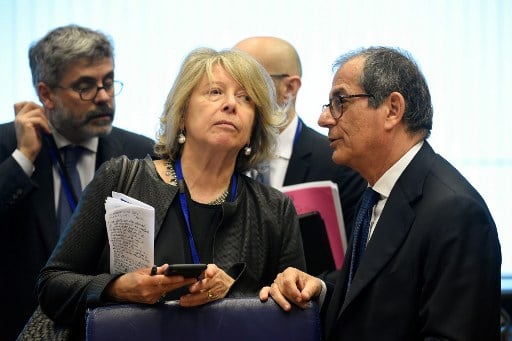“I would like Italy to take the hand extended by the commission and implement the appropriate measures,” said French Finance Minister Bruno Le Maire as he arrived for talks with his eurozone counterparts in Luxembourg.
Italy's debt ratio, at 132 percent of gross domestic product, is the second biggest in the eurozone after Greece.
This is way above the 60 percent EU ceiling, with the commission convinced that the debt will keep ramping up, leaving Italy vulnerable to economic shocks that could spill over to the rest of Europe.
READ ALSO: European stocks drop as trouble brews between Rome and Brussels
“There are rules in the eurozone, we all try to respect them,” added Le Maire, whose country has also fallen foul of EU budget rules in recent years.
The European Commission, the EU's executive arm, last week formally put populist-led Italy on notice for blowing belt-tightening commitments.
The process, known as an excessive deficit procedure, could lead to billions in fines, though this remains unprecedented and highly unlikely.
“In the end the rules are not just something which is written on paper, they have reasons,” said German Finance Minister Olaf Scholz.

Photo: Vincenzo Pinto/AFP“
Italian finance minister Giovanni Tria is in Luxembourg for talks with the European Commission on averting the threat of fines for breaking EU rules.
Tria told Italian media he had “ruled out” the possibility of the government approving an additional “corrective budget” to head off the threat of penalties.
“We are negotiating on the deficit targets that we have,” he said.
READ ALSO:
- Italy's populists lash out at Brussels over EU's debt warning
- What is Italy's flat tax and who would it benefit?
- 'Zero growth' for Italy this year: economy minister
Meanwhile, Tria is also reportedly resisting attempts by Deputy Prime Minister Matteo Salvini to press ahead with yet more spending, including tax cuts promised by Salvini's League party, estimated to cost at least 30 billion euros.
The coalition of the hard-right League and anti-establishment Five Star Movement is deeply divided on how to handle the offensive by Brussels, with Prime Minister Giuseppe Conte threatening to resign if the squabbling did not stop.
European economic affairs commissioner Pierre Moscovici, who is meeting Tria for talks, said his door was open to Rome and hoped for new proposals.
“I am in listening mode because while the door is open, we also want new elements to go through it,” he said.
READ ALSO: 2.7 million people apply for Italy's basic income scheme



 Please whitelist us to continue reading.
Please whitelist us to continue reading.
Member comments